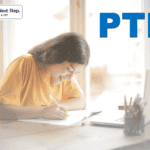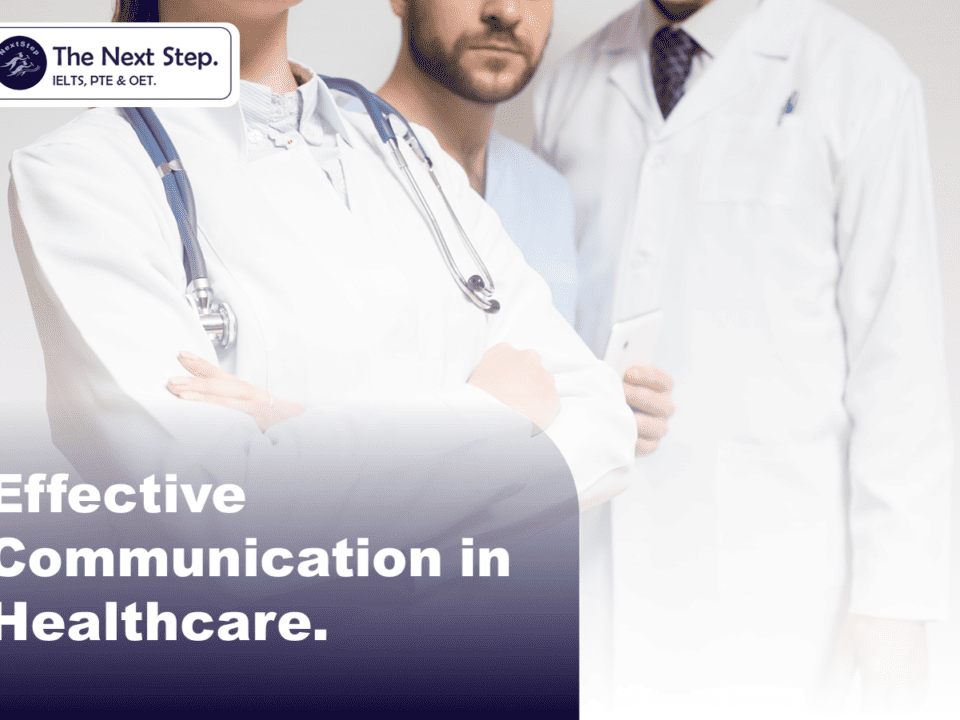
What is MOI?
December 10, 2023
PTE Writing Mastery: Tips and Techniques for Success
December 13, 2023What is OET?
The Occupational English Test (OET) is an examination specifically designed to assess the English language proficiency of healthcare professionals who wish to work in English-speaking healthcare environments. This comprehensive assessment ensures that individuals in the healthcare sector have the necessary language skills for effective communication in their professional roles.
OET focuses on the unique language demands faced by healthcare practitioners and covers a range of skills essential for success in medical settings. The test consists of four components, each targeting different aspects of language proficiency.
The Listening component evaluates the candidate’s ability to understand spoken English in healthcare scenarios. This includes comprehension of verbal communication among healthcare staff, patient interactions, and other relevant audio materials.
The Reading component assesses the test-taker’s capacity to comprehend and extract information from various healthcare-related texts. This includes materials like medical journals, patient records, and administrative documents, which reflect the diverse reading demands in the healthcare profession.
The Writing segment evaluates the candidate’s ability to express thoughts and information in writing, with a focus on producing a formal letter. Tasks may involve composing referral or discharge letters based on provided case notes or patient histories, simulating real-world professional communication.
Lastly, the Speaking component assesses the individual’s oral communication skills through role-play scenarios. Candidates engage in simulated interactions relevant to healthcare settings, demonstrating their ability to effectively communicate with patients, colleagues, and other stakeholders.
OET is widely recognized and accepted by healthcare regulatory bodies and councils in various English-speaking countries.
How to prepare for OET exam?
Understanding the Test:
– Familiarize yourself with the format of each OET sub-test: Listening, Reading, Writing, and Speaking.
– Take a look at sample materials to understand the different task types.
Assessing Your Skills:
– Take a practice test to identify your strengths and weaknesses.
– Use this assessment to create a study plan that suits your needs.
Creating a Plan:
– Develop a realistic study schedule that covers all sub-tests.
– Make sure to balance your focus on different language skills.
Improving Listening Skills:
– Practice listening to various English accents, especially in healthcare contexts.
– Utilize podcasts and healthcare-related content to enhance your listening abilities.
Enhancing Reading Skills:
– Read healthcare texts and practice skimming and scanning techniques.
– This will help you improve your reading speed and comprehension.
Developing Writing Skills:
– Practice writing formal letters with clarity and coherence.
– Seek feedback from teachers or participate in online forums to improve your writing skills.
Polishing Speaking Skills:
– Engage in role-plays that mimic healthcare scenarios.
– Record and assess your pronunciation and fluency to enhance your speaking abilities.
Using Official OET Materials:
– Make use of official OET practice materials for an accurate test simulation.
– This will help you become familiar with the test format and requirements.
Considering Preparation Courses:
– Think about enrolling in reputable OET preparation courses for targeted guidance.
– These courses can provide you with valuable tips and strategies to excel in the exam.
– Consider enrolling in the top OET coaching centers in your city for effective preparation.
Engaging with the Community:
– Join online forums to share tips and experiences with other OET candidates.
– This will create a supportive environment where you can learn from others.
Simulating Exam Conditions:
– Take full-length practice tests under timed conditions.
– This will help you get accustomed to the time constraints and pressure of the actual exam.
Reviewing and Revising:
– Regularly review your progress, revise challenging areas, and adjust your study plan accordingly.
– This will ensure that you are continuously improving and addressing any weaknesses.
Consistent practice and targeted preparation are key to succeeding in the OET exam. Focus on improving each language skill to ensure a well-rounded proficiency.
Promotional:
Criteria for Assessment for International Medical Graduates (IMGs) and Nursing Professionals
- IMGs who wish to obtain ECFMG Certification must score at least 350 (Grade B) in each of the four components of the OET (Medicine): Listening, Reading, Writing, and Speaking.
- For nurses who aspire to practice in Oregon, they must achieve a minimum of 4 Grade Bs (with a minimum score of 350). On the other hand, those seeking licensure in Florida must attain a minimum of 4 Grade C+s (with a minimum score of 300).
The ECFMG Certification, administered by the International Medical Education and Research, assesses the preparedness of IMGs to enter accredited residency or fellowship programs in the United States under the Accreditation Council for Graduate Medical Education. It is also a prerequisite for obtaining a medical license from the relevant Medical Licensing Authority.
OET Accepted Countries?
| Australia | Canada |
| Ireland | Maldives |
| Malta | Namibia |
| New Zealand | Philippines |
| Qatar | Singapore |
| Spain | Ukraine |
| United Kingdom (U.K.) | United Arab Emirates (UAE) |
| United States of America (USA) |
Understanding – OET Scores and Grades.
OET is evaluated on a scale of 0-500 in its four sections: Reading, Writing, Listening, and Speaking (also known as subtests). The score varies from 0 (lowest) to 500 (highest). Take a look at the table below to get a clear idea of your OET score, corresponding grade, and your level of English proficiency.
| OET SCORE | OET GRADE | YOUR LEVEL OF ENGLISH |
| 450-500 | A | You can communicate well and have fluency in the English language. You can fluently and effectively communicate with patients and healthcare professionals using appropriate registered tones and lexis. The candidate has a deep understanding of written and spoken language. |
| 350-440 | B | You can communicate effectively with patients and health professionals. Of course, there could be occasional inaccuracies and hesitations, but it shows a good understanding of clinical contexts. |
| 300-340 | C+ | Despite occasional errors and lapses, you can maintain the interaction in a relevant healthcare environment. |
| 200-290 | C | You can understand standard spoken language typically encountered in your specialization but may require clarification on higher-level language. |
| 100-190 | D | You can maintain some interaction and understand specific factual information in your field of specialization but may ask for clarification. However, inaccuracies could be frequent, and overuse of technical language can cause strain in communication. |
| 0-90 | E | You can manage simple interactions on familiar topics and understand the main point in short and simple messages. You can interact only if the other person is ready to clarify details. |





